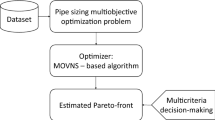Abstract
This paper explores the application of noncooperative game theory together with the concept of Nash equilibrium to the investigation of some basic problems on multi-scale structure, especially the meso-scale structure in the multi-phase complex systems in chemical engineering. The basis of this work is the energy-minimization-multi-scale (EMMS) model proposed by Li and Kwauk (1994) and Li, et al. (2013) which identifies the multi-scale structure as a result of ‘compromise-in-competition between dominant mechanisms’ and tries to solve a multi-objective optimization problem. However, the existing methods often integrate it into a problem of single objective optimization, which does not clearly reflect the ‘compromise-in-competition’ mechanism and causes heavy computation burden as well as uncertainty in choosing suitable weighting factors. This paper will formulate the compromise in competition mechanism in EMMS model as a noncooperative game with constraints, and will describe the desired stable system state as a generalized Nash equilibrium. Then the authors will investigate the game theoretical approach for two typical systems in chemical engineering, the gas-solid fluidization (GSF) system and turbulent flow in pipe. Two different cases for generalized Nash equilibrium in such systems will be well defined and distinguished. The generalize Nash equilibrium will be solved accurately for the GSF system and a feasible method will be given for turbulent flow in pipe. These results coincide with the existing computational results and show the feasibility of this approach, which overcomes the disadvantages of the existing methods and provides deep insight into the mechanisms of multi-scale structure in the multi-phase complex systems in chemical engineering.
Similar content being viewed by others
References
Li J H and Kwauk M, Particle-Fluid Two-Phase Flow: The Energy-Minimization Multi-Scale Method, Metallurgical Industry Press, Beijing, 1994.
Li J, Ge W, Wang W, et al., From Multi-Scale Modeling to Meso-Science: A Chemical Engineering Perspective, Springer, Berlin, 2013.
Li J H, Approaching virtual process engineering with exploring mesoscience. Chem. Eng. J., 2015, 278: 541–555.
Ge W, Wang W, and Yang N, Meso-scale oriented simulation towards virtual process engineering (VPE) — The EMMS paradigm, Chem. Eng. Sci., 2011, 66(19): 4426–4458.
Floudas C A, Niziolek A M, Onel O, et al., Multi-scale systems engineering for energy and the environment: Challenges and opportunities, AIChE J., 2016, 62: 602–623.
Li J H, Ge W, Wang W, et al., Focusing on mesoscales: From the energy-minimization multiscale model to mesoscience, Current Opinion in Chemical Engineering, 2016, 13: 10–23.
Li J H, Multiscale-modeling and method of energy minimization for particle-fluid two-phase flow, PhD thesis, Institute of Chemical Metallurgy, Chinese Academy of Sciences, Beijing, China, 1987.
Fudenberg D and Tirole J, Game Theory, Mass. MIT Press, Cambridge, 1991.
Nash J, Non-cooperative Games, Annals of Mathematics, 1951, 54: 286–295.
Nash J, Equilibrium points in n-person games. Proceedings of the National Academy of Sciences, 1950, 36: 48–49.
Dixit A K and Nalebuff B J, The Art of Strategy: A Game Theorist’s Guide to Success in Business and Life. W. W. Norton Company, 2010.
Basar T and Olsder G J, Dynamic Noncooperative Game Theory, 2nd Ed. SIAM Series in Classics in Applied Mathematics, SIAM. Philadelphia, 1999.
Li Y, Leade-follower differential games, adaptive games and the application of game theory in chemical engineering, PhD thesis, Academy of Mathematics and Systems Science, Chinese Academy of Sciences, Beijing, China, 2013.
Li J H, Reh L, and Kwauk M, Application of the principle of energy minimization to fluiddynamics of circulating fluidized bed, Circulating Fluidized Bed Technology III, Eds by Basu P and Horio M, Hasatani Pergamon Press, Oxford, 1991, 105–111.
Li J H, Chen A H, Yan Z L, et al., Particle-fluid interacting in circulating fluidized beds, The 4th International Conference on Circulating Fluidized Beds, Ed. by Avidan A A, AIChE, 1993, 48–53.
Li J H and Kwauk M, Multiscale nature of complex fluid-particle systems. Ind. Eng. Chem. Res., 2001, 40: 4227–4237.
Hinze J O, Turbulence, McGraw-Hill, New York, 1975.
Chou P and Chou R, 50 years of turbulence research in China, Annual Reviews in Fluid Mechanics, 1995, 27: 1–16.
Li J H, Zhang Z D, GeW, et al., A simple variational criterion for turbulent flow in pipe. Chemical Engineering Science, 1999, 54: 1151–1154.
Prandtl L, Oswatistsch K, and Wieghardt K, Fundamental of Fluid Dynamics, Science Press, Beijing, 1981.
Schlichting H and Gersten K, Boundary-Layer Theory, 8th ed., Springer, Berlin, 2000.
Wang L M, Discrete simulation for single-phase complex flows, Phd thesis, Institute of Chemical Metallurgy, Chinese Academy of Sciences, Beijing, China, 2008.
Acknowledgments
The authors would like to thank Prof LI Jinghai for his encouragements and valuable suggestions; and thank Prof. YANG Ning, Dr. WANG Limin and Dr. ZHANG Lin for the helpful discussions on physics motivating this paper. The authors also thank Dr. CHENG Jinsan and Ms. XIE Siyu for their kind help in solving equations theoretically or using Matlab.
Author information
Authors and Affiliations
Corresponding author
Additional information
The paper was supported by the National Natural Science Foundation of China under Grant Nos. 11688101, 91634203, 61304159 and by the National Center for Mathematics and Interdisciplinary Sciences.
This paper was recommended for publication by Editor CHEN Jie.
Rights and permissions
About this article
Cite this article
Li, Y., Mu, Y., Yuan, S. et al. The game theoretical approach for multi-phase complex systems in chemical engineering. J Syst Sci Complex 30, 4–19 (2017). https://doi.org/10.1007/s11424-017-6287-1
Received:
Revised:
Published:
Issue Date:
DOI: https://doi.org/10.1007/s11424-017-6287-1




